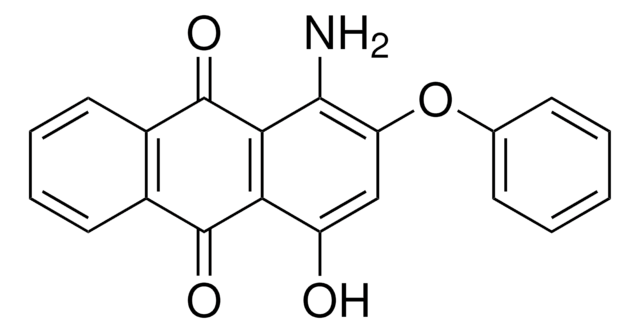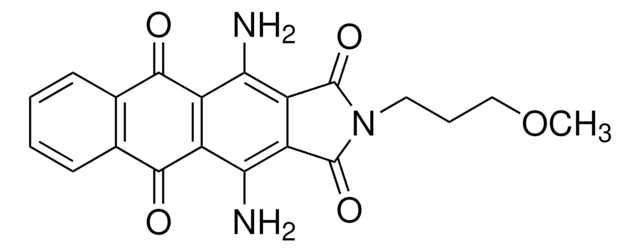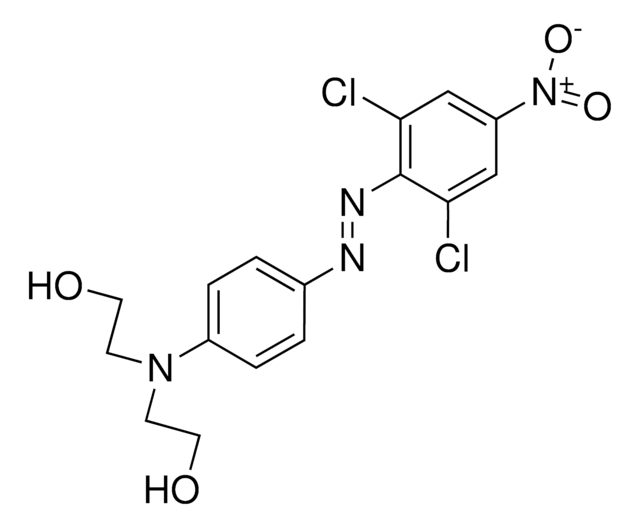Recommended Products
grade
for microscopy
Quality Level
application(s)
environmental
format
neat
InChI
1S/C16H19N5O4S/c1-4-20(7-8-25-12(3)22)13-5-6-14(11(2)9-13)18-19-16-17-10-15(26-16)21(23)24/h5-6,9-10H,4,7-8H2,1-3H3
InChI key
HMAJVAFLGGPIPN-UHFFFAOYSA-N
Looking for similar products? Visit Product Comparison Guide
General description
Disperse Blue (DB) 124 is a strong clothing dye sensitizer. It is also an important textile dye allergen.
Application
DB 124 was used during testing the sensitizing potential of the dye using loose-fit coculture-based sensitization assay (LCSA).
Other Notes
Dye standard for the assay of allergy-releasing dyes in textiles
Signal Word
Danger
Hazard Statements
Precautionary Statements
Hazard Classifications
Acute Tox. 3 Oral - Skin Sens. 1
Storage Class Code
6.1C - Combustible acute toxic Cat.3 / toxic compounds or compounds which causing chronic effects
WGK
WGK 2
Flash Point(F)
Not applicable
Flash Point(C)
Not applicable
Personal Protective Equipment
dust mask type N95 (US), Eyeshields, Gloves
Choose from one of the most recent versions:
Already Own This Product?
Find documentation for the products that you have recently purchased in the Document Library.
Customers Also Viewed
Nonpruritic contact dermatitis from disperse blue dyes.
Aaron Wong et al.
Dermatitis : contact, atopic, occupational, drug, 22(5), 278-280 (2012-06-02)
B M Hausen
Contact dermatitis, 28(3), 169-173 (1993-03-01)
9 cases of allergic contact dermatitis due to black "velvet" fabrics, mostly leggings, are reported. In all cases, the 2 disperse dyes Blue 106 and 124 were shown to be the responsible contact sensitizers. Preparation of a chloroform extract and
Dan Slodownik et al.
Contact dermatitis, 65(1), 38-42 (2011-02-12)
Textile allergy is a well-established entity, but there are relatively few Australian reports in this area. To report the combined experience of textile contact dermatitis from the general and occupational contact dermatitis clinics at the Skin and Cancer Foundation, Melbourne
P Komericki et al.
Journal of the American Academy of Dermatology, 45(3), 456-458 (2001-08-21)
The diagnosis of purpura pigmentosa progressiva in a female patient had to be changed to purpuric contact dermatitis after patch testing with textile dyes. A modified patch test performed in the area in which most of her skin lesions were
M Khanna et al.
American journal of contact dermatitis : official journal of the American Contact Dermatitis Society, 12(4), 208-210 (2001-12-26)
Reports of textile dye allergic contact dermatitis are becoming frequent in the literature. Occupational exposure to textile dyes has been reported, but less frequently. To report 2 cases of allergic contact dermatitis to Disperse Blue dyes 106 and 124 occurring
Our team of scientists has experience in all areas of research including Life Science, Material Science, Chemical Synthesis, Chromatography, Analytical and many others.
Contact Technical Service












